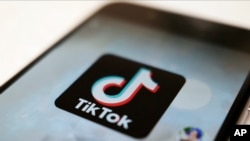The popular social media service TikTok has become a source for information on the war in Ukraine for many of its users.
But some researchers worry that the app often misleads its 1 billion users worldwide. That is because much of what is appearing on TikTok is unconfirmed.
Jessica Brandt is the policy director for the Artificial Intelligence and Emerging Technology Initiative at The Brookings Institution in Washington, D.C. She said, “Those [videos] can be used to enlighten folks on what's really happening on the ground.” But she added, “They can also be taken out of context and used to mislead or to disinform. We see all of that happening in this conflict.”
TikTok is not the only social media service that has the power to misinform young people about the war in Ukraine. Ryan Locher is a student at American University in Washington. He puts videos and other material on TikTok. He has more than 18,000 followers. Locher told VOA that he has seen a number of false stories on the Russia-Ukraine conflict gaining support on other popular social media apps.
“I see it on Twitter, obviously on TikTok,” he told VOA. “It is very easy to pick up where these people are coming from.”
Student outlooks
Locher said he has seen pro-Russian TikTok users spreading conspiracy theories meant to explain the Russian invasion of Ukraine. Those theories include reported bioweapons laboratories in Ukraine and Ukrainian links to Nazi extremists.
Some false information aims to mislead, Locher said. He also suggested that other material comes from peoples’ past beliefs affecting their attempts to understand the conflict.
Andriana Markiv, a U.S. citizen born in Ukraine, is studying at American University in Washington. She said, “Not all of it [misinformation] comes from a place of hatred; sometimes the people spreading fake news genuinely don’t know.”
However, Markiv said some users post false information to create controversy – and traffic – on social media services. “They do it to get likes and comments,” she added.
But misinformation about the war is upsetting to many Ukrainians.
“I call my family and I hear them crying and then I go on social media and see people saying that this war is Ukraine’s fault or spreading pro-Russian propaganda. I try to go past that because it is hard,” Markiv said.
Chinese ownership
TikTok is owned by the Chinese company ByteDance. For this reason, some worry it serves as a tool for China to influence the opinions of people around the world.
Matthew Lee is a student at American University’s School of International Service. He does not use TikTok.
“We see in Chinese social media like a lot of nationalist stuff being said, a lot of pro-Russian stuff being said, and because of how tightly they control everything, it's hard to say whether it really is real people or folks that the Chinese government pays to say things,” Lee told VOA.
Some researchers believe that this is part of a larger goal by the Chinese government to use information to fit its policy goals. This could relate to the war in Ukraine or other political goals around the world.
Brandt of The Brookings Institution commented on China’s efforts to shape opinions. She said “…those efforts are becoming more assertive and I think they'll only continue to grow.”
I’m Gregory Stachel.
Ali Siddiqi and Lori Rampani reported this story for Voice of America. Gregory Stachel adapted it for VOA Learning English.
Editor's Note: This story has been updated to say that Andrianna Markhiv is a U.S. citizen.
_____________________________________________________________________
Words in This Story
app (application) – n. a computer program that carries out a specific job
folks – n. (pl. informal) people in general
obviously – adv. used to emphasize that you are talking about something that is easy to see, understand, or recognize
conspiracy theory – n. a theory that explains an event or situation as the result of a secret plan by usually powerful people or groups
fake – adj. not true or real
genuinely – adj. sincere and honest
controversy – n. argument that involves many people who strongly disagree about something: strong disagreement about something among a large group of people
stuff –n. (informal) used to refer to something when you do not need to name exactly what it is
assertive – adj. confident in behavior or style
We want to hear from you. Write to us in the Comments section, and visit our Facebook page.




